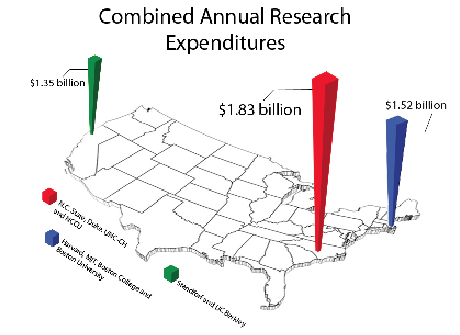According to the Office of Technology Transfer, of the 274 intellectual properties submitted last year by university researchers, 141 patents were filed with the United States Patent Office, and of those 120 patents were issued. Between patents, startups, commercial and other agreements, N.C. State received a license revenue of $6.4 million in the last fiscal year.
But the benefits of research go far beyond revenue, said Kelly Sexton, interim director of the Office of Technology Transfer. Sexton said there is a direct correlation between research expenditure and job creation.
“We have over 100 startup companies that have launched based on university research,” Sexton said. “These companies have gone on to create 6,500 jobs with 3,100 jobs within the state of North Carolina. These startup companies have gone on to garner more than $1 billion in investments. So we think there is a direct link between the research going on here and the economic growth in the region.”
Although there is certainly a strong industry presence on Centennial Campus, Sexton said there was little reason to believe industry funding will be able to compete with the level of federal funding the University receives anytime soon.
“Federal funding is the bedrock of the University’s research, and even though the numbers have gone down. The impact of industry funding at the University level is still not that great when compared to how much funding we receive from the Federal government, and that’s the case at most universities,” Sexton said.
The benefits of working with industry are not based on direct monetary funding, according to Sexton, but rather a way for faculty members to be engaged in their discipline outside the realm of academia, to develop commercially relevant programs.
Sexton said the benefits of research went far beyond revenue and job creation.
“By far, most research is still basic research based on scientific inquiry, and it will continue to be, provided federal funding doesn’t completely dry up, which I don’t believe will happen,” Sexton said.
Sexton said it was important to recognize the role research plays in education and to recognize the value of the humanities at the same time. The two, he said, were inextricably linked.
“We cannot tackle society’s grand challenges without having an integrated team approach,” Sexton said.
In his State of the Union address earlier this year, President Barack Obama laid out his vision for what he called “a level of research and development not seen since the height of the Space Race” The BRAIN Initiative, a $100 million line item in the President’s Fiscal Year 2014 budget designed to help researchers find new ways to treat, cure and even prevent brain disorders like Alzheimer’s disease, epilepsy and traumatic brain injury.
“This is definitely one of those grand challenges, and while we don’t have a medical school, what we do have is a lot of great engineers, and we’re really poised to take advantage of our relationship with UNC’s medical school and joint biomedical engineering department,” Sexton said. “We’re really well positioned to engage in multidisciplinary collaborative research projects to better understand neuroscience and engage in new effort there.”
Liana Fryer, director of planning and communication in the Office of Research, Innovation and Economic Development said that when it came to basic research, patents and federal investments, it was important for all involved to maintain a sense of priorities.
“Many of the most important, life-altering innovations are not patented and may not generate revenue,” said Fryer. “In addition, it is very important to recognize that basic research is conducted to discover new knowledge and better understand our universe (and those beyond). This research most often does not result in a patent.”








